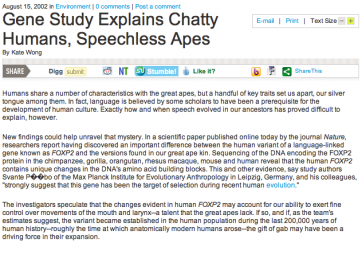This web page was produced as an assignment for Genetics 677, an undergraduate course at UW-Madison.
Gene Study Explains Chatty Humans, Speechless Apes
On August 15, 2002, Scientific American, a popular science magazine released an article reviewing a study done on the evolution of the FOXP2 gene within the great apes and other close mammalian relatives of humans. The study sequenced the FOXP2 gene in the chimpanzee, the gorilla, the orangutan, the rhesus macaque, the mouse and the human. In doing so, the study revealed that the human variant of the gene contains unique mutations. The authors of the study believe that these mutations may by responsible for humans' ability to control the fine movement of our tongue and larynx, which give us the ability to speak. The authors' study estimates that the mutations arose within the last 200,000 years of human existence. Furthermore, according to the authors, this evidence strongly suggests that the gene under went selection during recent human evolution, and may have given us the traits that allowed human expansion and the development of human culture.
This article does a good job of summarizing the main points of the study done by Enard et al. The article, although short, explains the rationale behind doing the study. The article explains that language is believed to be one of the first steps in the development of human culture, and that human language is an important characteristic that separates us from our closest living relative. The article does well at explaining the findings of the study and the reasoning behind the conclusions the authors drew from their evidence. Although the article and the study are over six years old, this discovery is an important stepping stone in understanding the evolution of human speech.
References
1. Enard W, Przeworski M, Fisher SE, Lai CSL, Kitano WV, et al. (2002) Molecular evolution of FOXP2, a gene involved in speech and language. Nature 418:869–872. PMID: 12192408
2. Wong, K. (2002, August 15) Gene study explains chatty humans, speechless apes. <http://www.sciam.com/article.cfm?id=gene-study-explains-chatt>
Andrew Tritt
tritt at wisc dot edu
Last updated 03/15/2009
Genetics 677

